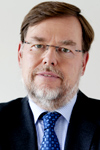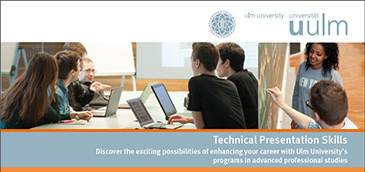Communication Skills for Scientists and Engineers
Science and engineering is not just about knowledge. The ability to communicate your ideas and findings is crucial, be it in the form of journal papers, a conference presentation, or that crucial pitch to your boss. “Communication Skills for Scientists and Engineers” prepares you for those situations. It tells you how to craft effective presentations and structure written documents for clarity and impact, all the while observing the highest ethical standards.
The course is taught by Professor Hermann Schumacher, who has authored and co-authored 370 journal articles and contributions at major conferences, in the areas of micro- and millimeter-wave circuit design, compound semiconductor devices, optoelectronics, but also the didactics of continuing education. The course will be delivered in a blended-learning format, with a kick-off meeting in Ulm, guided online self-learning, and a concluding two-day seminar in the Austrian Alps.
Timeline
- Kick-off meeting: to be announced
- From April to July: weekly assignments (with individual
feedback) - Final seminar: end of July expected
- Due date for the Scientific Writing Exercise: to be announced
The description of the module you find here.
- Presentation quality criteria
- Researching a subject
- Structuring oral presentations
- Visual aids preparation
- Multimedia techniques
- Public speaking
- Handling questions and critique
- Written presentations:
- 1. Research reports
- 2. Journal arcticles
- 3. Theses
- Presenting technical matters on the web and in social media
- Ethical aspects of creating and communicating scientific results
Studets recognize proven techniques for technical oral presentations supported by visual aids. In the preparation of their presentation, they distinguish different target audiences and devise their presentation strategy accordingly. They differentiate between different forms of presentation and develop suitable communication strategies. They are familiar with ethical standards, including forms of plagiarism, and are conformant with these standards.
Students create an oral presentation on a topic of their choice within an annually changing topical framework, defend their ideas in front of their peers, and summarize their presentation in a three-page written report.
Kick-off meeting (in person), video lectures, self-evaluation questions, weekly assignments, individual tutoring based on assignments, participation in seminar weekend, seminar presentation, participation in questions and critique sessions, preparation of abstract in IEEE workshop format.
No special requirements
Recommended requirements:
- Desktop computer or notebook, with a supported version of Microsoft Windows, Apple macOS or Linux
- Headset
- Current version of Mozilla Firefox, Google Chrome, Apple Safari or Microsoft Edge
- Access to the internet (e.g., via xDSL, Cable, LTE, 5G) with a minimum data rate of 3 Mbit/s for downstream and 384 kbit/s for upstream.
In case of questions regarding the technical requirements, please don't hesitate to contact us.
- You will need to complete the included self-assessments and other tasks on time.
- There will be a discussion forum for this course. You do not only have the possibility to ask and answer questions there - it is obligatory. Each one of you is expected to post at least four contributions to the forum - be it questions, answers, or interesting pointers to material you found useful.
- You will then prepare a presentation of your own. We use 20 minutes in length, a rather standard format for scientific conferences. You can select a topic on your own, but within the confines of a given global theme. The presentations will be given on one or two days toward the end of the semester, most likely on Saturdays.
- Finally, you will prepare a written abstract about your presentation, 3 pages in length, using a predefined format (the IEEE conference abstract format).
After finishing your exame successfully you will get a certificate and a supplement, which will list the contents of the module and the competencies you have acquired. In the supplement the responsible person for the module confirms you the equivalent of 3 credit points (ECTS).
The fee for participating in the module “Technical Presentation Skills” is 270 Euro.


